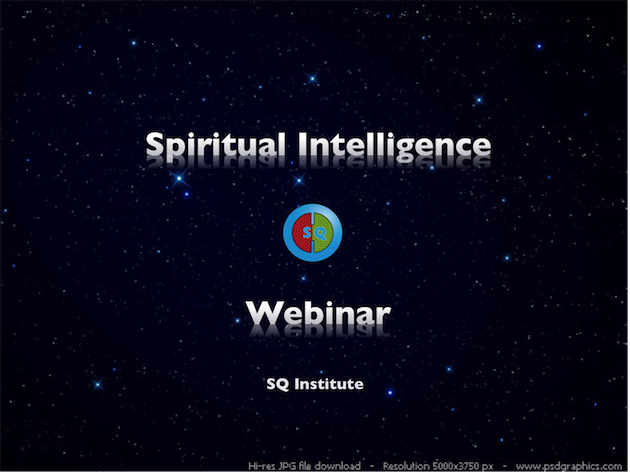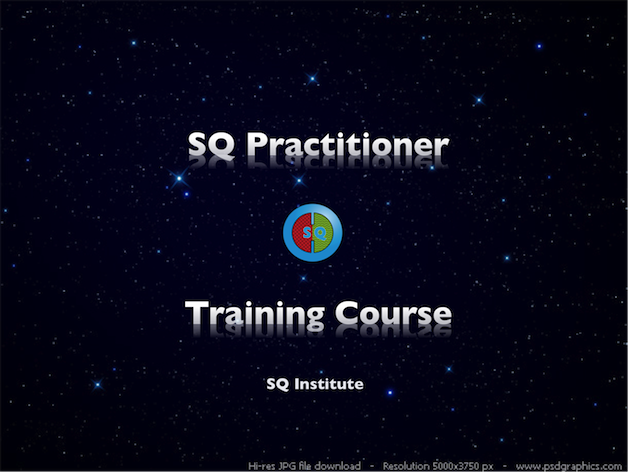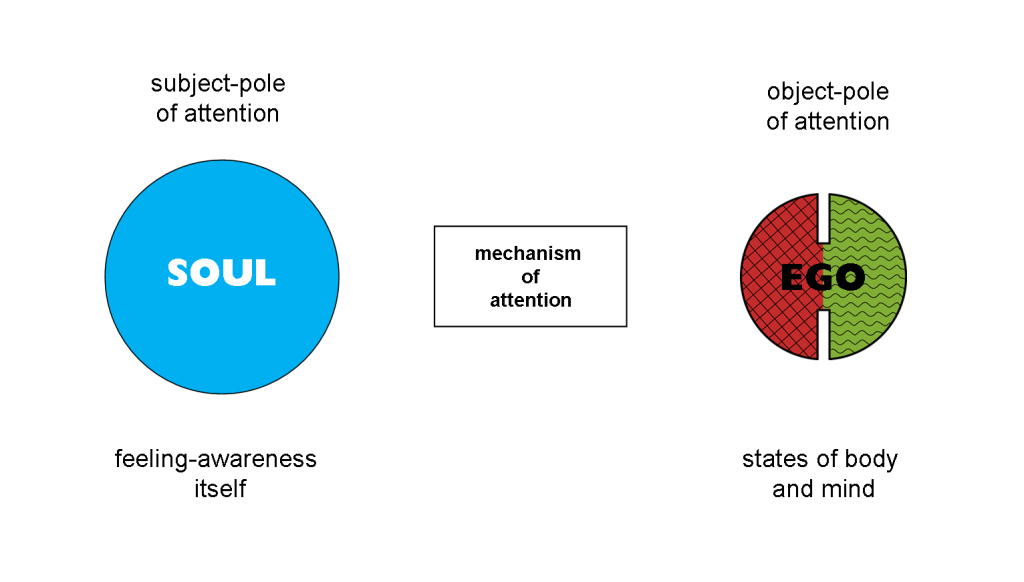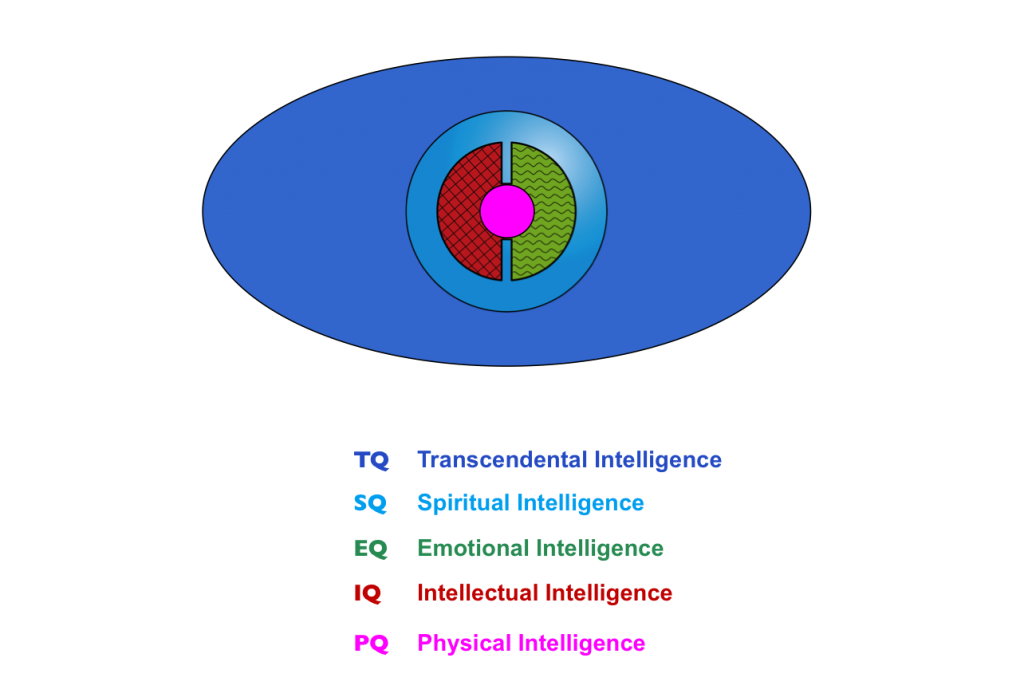
The full spectrum of intelligence is made up of five dimensions, from PQ to TQ, via IQ, EQ and SQ.
PQ
Physical intelligence is a property of all life-forms. PQ controls our breathing and regulates the autonomic nervous system. The coordination required to walk or put on a jacket is a PQ capability.
IQ / EQ / SQ
After PQ comes IQ and EQ, which are about intellect and emotion, followed by SQ, which is about values and meaning. SQ replaces the ego with the soul, as the seat of personal identity, and as the governor of PQ, IQ, and EQ. The qualities of SQ are experienced at the subject-pole of attention in moments of presence, in the form of wisdom, compassion, integrity, joy, love, creativity, and peace. SQ therefore increases personal fulfilment and social responsibility, boosts individual and group performance, and results in cooperation, tolerance and peace between people.
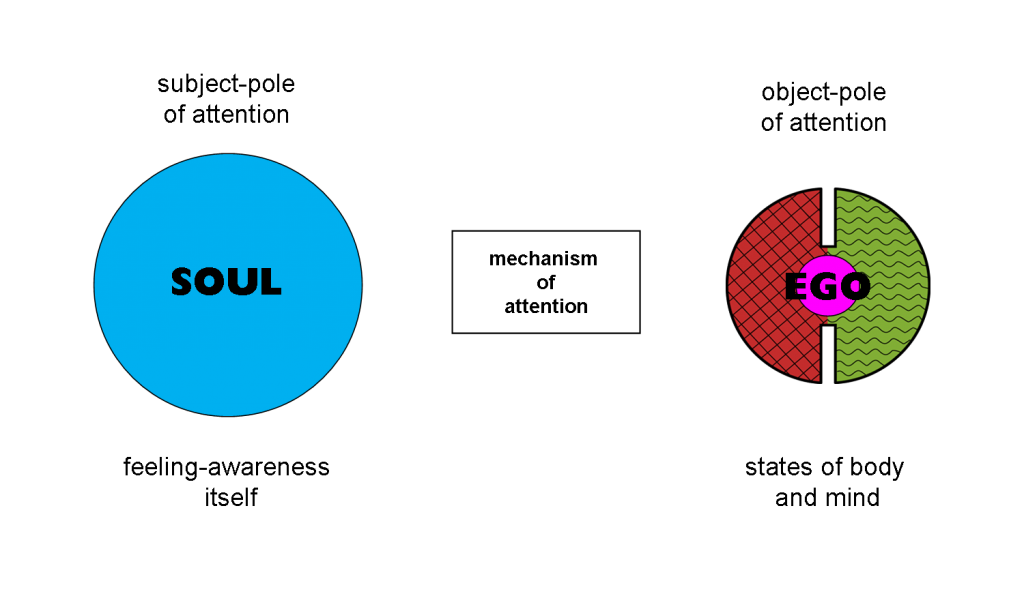
TQ
Beyond SQ is the ultimate dimension of intelligence, called TQ (transcendental intelligence). Whereas SQ shifts from the ego to the soul by transcending the object-pole of attention, TQ shifts from the individual soul to the universal soul by transcending both poles of attention and the mechanism of attention altogether. TQ is the intelligence of non-individuated feeling-awareness itself, which is the self-existing and self-radiant ground of all being, and the transcendental source of all.
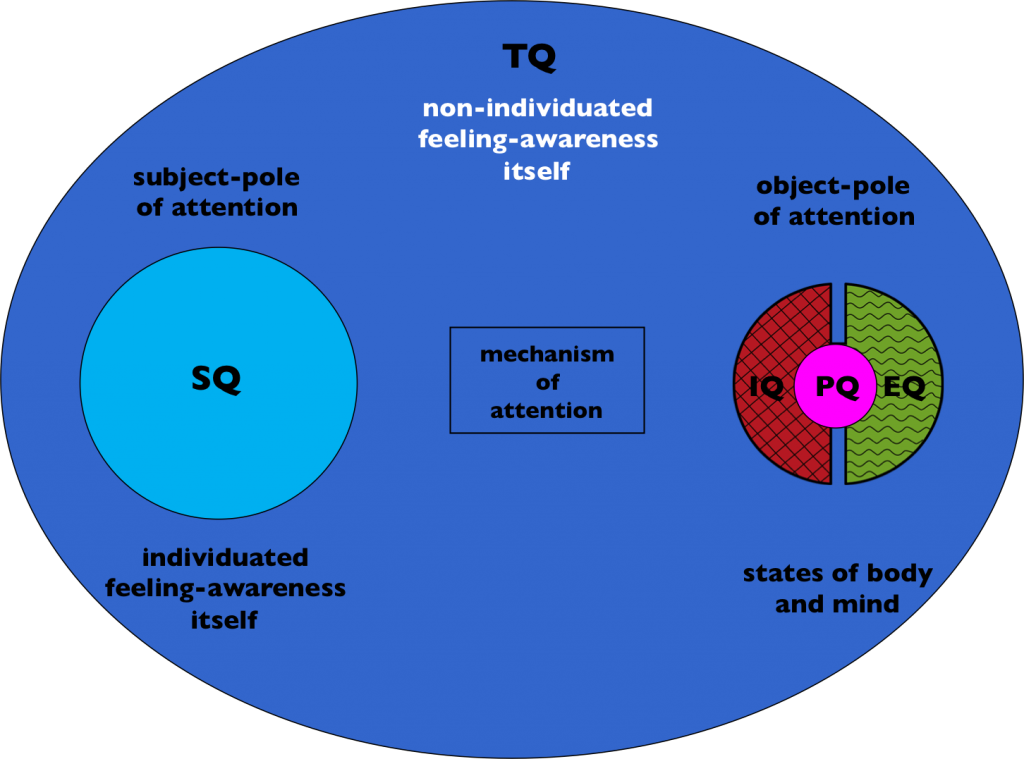
Not surprisingly, TQ is extremely uncommon. There are very few reports of stable and permanent TQ on record. Limited and temporary forms of TQ occur more often, as evident from studies in transpersonal psychology, and from art and literature, and from the histories of spiritual traditions. However, even partial TQ experiences, with rare exceptions, result from many years of preparation.
The Separate God Idea

TQ is the intelligence of transcendental consciousness (non-individuated self-existing self-radiant feeling-awareness). But if you merely believe in the existence of a transcendental dimension of reality, as an article of faith, without actually experiencing transcendental consciousness as your own inherent source, then transcendental reality is objectified as something separate from yourself. This gives rise to the idea of a separate God. The objectifying effect of religious belief thus personifies transcendental reality in the form of a separate deity. According to religious belief, human beings are "made in the image of God." But according to transcendental intelligence, it's the other way around. From the non-dual TQ point of view, the religious idea of a separate God is made in the image of the separate ego. The separate God idea of religious faith is therefore a contraction of TQ, reflecting the separate state of the believer's ego.
Atheism

In addition to rejecting belief in the existence of a God, atheists usually subscribe to materialism, which is the belief that reality is fundamentally physical or material. Many atheists simply assume the truth of materialism, based on their rejection of theism (belief in the existence of a God as a separate being). Materialism and theism are widely regarded as the only possible alternatives. Therefore, it is assumed that if theism is false, then materialism must be true. But this is not so. The SQ paradigm represents an alternative that supersedes both theism and materialism, as explained below.
Materialism

The philosophy of materialism goes back a long way. As an explicit belief system about the ultimate nature of reality, materialism dates back to ancient Greece, and even earlier. However, in the civilisations of the ancient world, materialism was a minority point of view, on the fringe of the prevailing mainstream religious culture. But after the scientific revolution in 17th century Europe, materialism for the first time gained mainstream cultural support. With the official endorsement of orthodox science, the philosophy of materialism has now become the dominant paradigm of contemporary secular culture. But, ironically, at the height of its influence, the theory of materialism has been discredited. Quantum physics represented the first scientific challenge to materialism. But the final blow to its legitimacy was the emergence of the integral scientific method, upon which the SQ paradigm is based. The findings of integral science confirm that belief in materialism results from using IQ and EQ without engaging SQ [1]. The emergence of the SQ paradigm therefore signifies that the theory of materialism, both as a scientific premise and as a philosophical world-view, has now been superseded.
Beyond Materialism
Spiritual intelligence represents the secular pathway beyond materialism. SQ is experienced by identifying with feeling-awareness itself at the subject-pole of attention, rather than with states of body and mind at the object-pole of attention. SQ thus recognises two separate and distinct domains, located at opposite poles of attention, neither of which can be reduced to the other. The conscious psyche, in the form of feeling-awareness itself, is located at one pole of attention, and everything else, including the physical dimension of existence, is necessarily located at the other pole. Acordingly, from the SQ perspective, it's self-evident that reality is essentially psycho-physical in nature, rather than fundamentally merely physical, as claimed by the philosophy of materialism.
Non-theistic Spirituality
SQ thus refutes the philosophy of materialism, based on the irreducible psycho-physical nature of experiencing the world. On the evidence of direct personal experience, without resort to religious faith, SQ verifies that feeling-awareness itself (or the soul) is inherent in every possible experience of material reality. Moreover, this is true regardless of whether awareness is an epiphenomenon, dependent on the physical brain, as claimed by the philosophy of materialism. Regardless of the origin of human consciousness, the point is that the subject-pole of attention is inherent in every possible moment of our awareness. The experience of spiritual intelligence therefore transcends the materialist view of reality, based on the undeniable reality of non-material consciousness, at the subject-pole of attention. SQ thus negates the belief that everything is material, on the basis of that which is inherently and irreducibly not material, namely, feeling-awareness itself. Belief in materialism is thus transcended in spiritual intelligence, without requiring belief in the existence of a God. The SQ paradigm therefore represents the foundation of non-theistic spirituality.
Nature of Existence
The basic nature of existence is understood according to the dimensions of intelligence available at each stage of development from ego, to soul, to transcendental being.

The ego identifies with the products of IQ and EQ at the object-pole of attention, in the form of states of body and mind. Therefore, from the ego perspective, the basic nature of existence is understood in object-pole terms. Object-pole explanations of existence include both materialism and theism. Both these opposing viewpoints seek to explain existence with reference to phenomena at the object-pole of attention. According to materialism, the basic stuff of existence is made of atoms and molecules. According to theism, the basic stuff of existence is a separate creator God. A separate God is as much an object of attention as an atom or a molecule. Therefore, materialism and theism belong together. Both these opposing viewpoints originate from the perspective of the separate ego, which exercises IQ and EQ, without SQ or TQ.

From the soul perspective, which exercises IQ and EQ with SQ, but without TQ, the basic nature of existence is understood not in object-pole terms, but in subject-pole terms. Subject-pole explanations of existence are made from the position of individuated feeling-awareness itself (or the soul). From the soul perspective, the spiritual qualities of the soul are the basic stuff of existence, not anything located at the object-pole of attention, such as atoms and molecules, or the separate ego, or the religious idea of a separate God. The spiritual qualities of the soul are experienced at the subject-pole of attention in moments of presence, in the form of wisdom, compassion, integrity, joy, love, creativity, and peace. Spiritual intelligence experiences these soul qualities in association with everything experienced at the object-pole of attention. Therefore SQ uses thought, emotion, and perception, and every other experience at the object-pole of attention, including the discoveries of science, not for the purposes of the ego, but for the purposes of the soul.

- Transcendental perspective
From the transcendental perspective, which has access to the full spectrum of intelligence, the basic nature of existence is located prior to both poles of attention, in the state of non-individuated feeling-awareness itself. TQ experiences being lived by the whole, with no separate self-identity, either as the ego or as the soul, even while functioning as an apparent individual, animating a separate body-mind. The basic nature of existence is experienced by TQ as transcendental consciousness (non-individuated self-existing self-radiant feeling-awareness). In the ancient wisdom tradition of Vedanta, TQ is described as satchitananda (truth-consciousness-bliss). TQ is a state of non-dual awareness, and therefore recognises energy as the radiance of consciousness, not as something separate from consciousness. Consequently, from the transcendental point of view, the world was not created by something separate from the world, in the person of a separate God. From the vantage point of TQ, the world arises within self-exisiting self-radiant transcendental consciousness, as a stepped-down dualistic modification of non-dual transcendental consciousness itself [2, 3, 4].
Necessary and Sufficient
Transcendental intelligence represents a highly advanced state of consciousness [5, 6, 7]. Even limited forms of TQ can take a lifetime of dedication to develop, after a long process of neural development, based on intensive spiritual practice. Consequently, TQ is extremely uncommon. A collective paradigm shift based on TQ therefore belongs in the distant future, at a later stage of human brain development. But SQ is different. SQ is accessible to everyone right now, at the current stage of human brain development. Moreover, spiritual intelligence is sufficient for profound transformation. The shift from the ego to the soul has enormously beneficial consequences. SQ increases personal fulfilment and social responsibility, boosts individual and group performance, and results in cooperation, tolerance and peace between people. When SQ is exercised on a community-wide scale, new norms are created, and society is thus transformed, as governments are repurposed and corporations are reformed, according to spiritually intelligent principles. Accordingly, at this point in our history, at the dawn of the third millennium, faced with unprecedented global crises of our own creation, coupled with immense potential for improving the quality of life for all, SQ represents the necessary and sufficient means of individual and collective transformation.
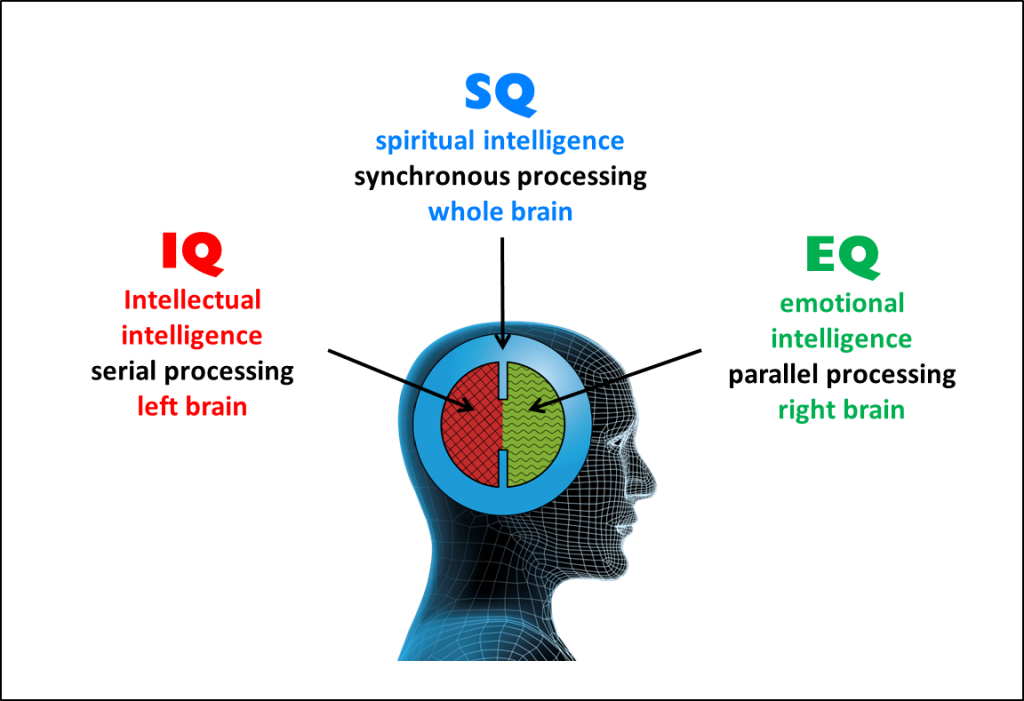
Sources
This article is based on a synthesis of findings from various fields of research, including cognitive psychology, psychoanalysis, transpersonal psychology, and neuroscience. These findings are summarised in the post entitled The Psychology of Spiritual Intelligence.
How to Experience Spiritual Intelligence [Video]
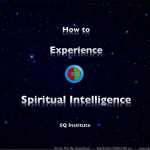
Spiritual intelligence is easy to experience. We all experience SQ spontaneously at times. But spontaneous moments of SQ are rare and unpredictable. Therefore it's important to know how to experience SQ intentionally. When you can engage your spiritual intelligence voluntarily, at any time of your own choosing, SQ becomes your most powerful personal resource. This video provides step-by-step instructions on how to activate SQ intentionally.
Watch the video here
References
About Spiritual Intelligence (SQ)
- Zohar, D., Marshall, I. (2001) SQ: Connecting With Our Spiritual Intelligence
- Amramt, Y. (2007) The Seven Dimensions of Spiritual Intelligence
- Draper, B. (2010) Spiritual Intelligence: A New Way of Being
- Wilber, K. (2000) Integral Psychology: Consciousness, Spirit, Psychology
- Griffiths, R. (2012) Wisdom for the New Millennium. Currently in preparation.
SQ Sources
- Rajneesh, Bhagwan Shree (1980) Book of the Secrets
- Muktananda, S. (1978) Play of Consciousness
- Thomas a Kempis (1441) The Imitation of Christ
- Rastogi, T. (1982) Islamic Mysticism
- Tolle, E. (2004) The Power of Now
- Yogananda, P. (1945) Autobiography of a Yogi
- Aurobindo, Sri (1940) Integral Yoga: Sri Aurobindo's Teaching and Method
Cognitive Psychology
- Segal, Z. et al (2002) Mindfulness-based cognitive therapy (MBCT)
- Fulton, P. et al (2005) Mindfulness and Psychotherapy
- Brown, K.W. (2003) The Benefits of being Present
Psychoanalysis
Neuroscience
History and Philosophy of Science
- Kuhn, T. (1970) The Structure of Scientific Revolutions
- Popper, K. (1959) The Logic of Scientific Discovery
- Henry, J. (2008) The Scientific Revolution and the Origins of Modern Science
Transpersonal Psychology
About Transcendental Intelligence (TQ)
TQ Sources
The Tradition of Advaita Vedanta- Astavakra Gita
- Tripura Rahasya
- Maharshi, R. (1989). Be as You Are: The Teachings of Sri Ramana Maharshi
The Traditions of Buddhism- The Diamond Sutra
- Mahayanavimsaka
- Lankavatara Sutra
The Jain Tradition- Chand, B. (1987) Lord Mahavira
The Tradition of Samkya Yoga- Feuerstein, G. (1989) The Yoga-Sutra of Patañjali
The Adidam Tradition- Samraj, Adi Da (1973) The Method of the Siddhas
